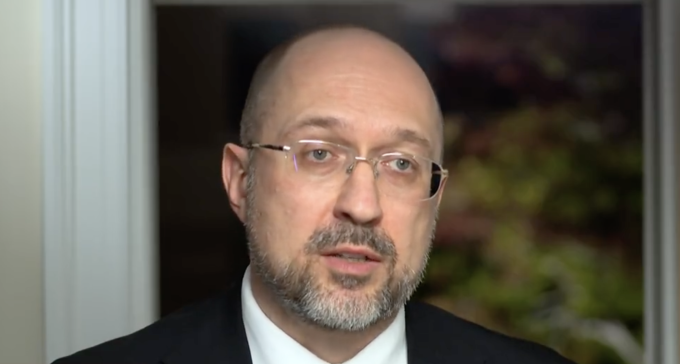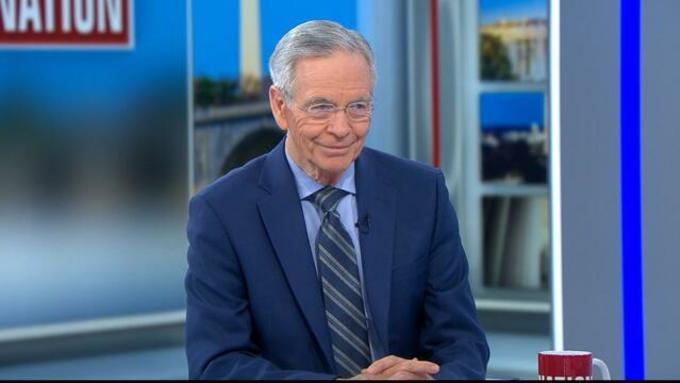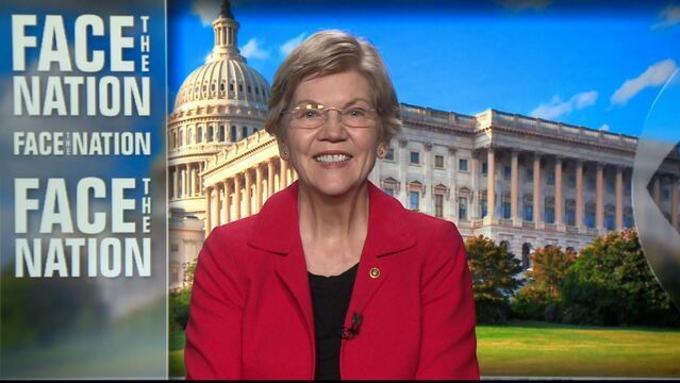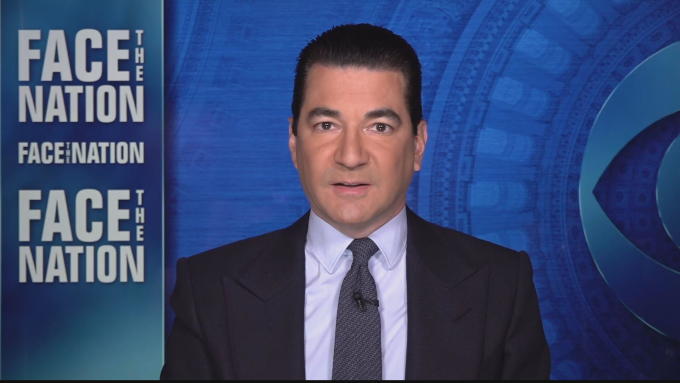| "I think that the Russian Federation and Putin are not interested in this negotiation. They are interested in other things. They are interested in genocide of Ukrainians." - Ukrainian Prime Minister Denys Shmyhal comments on U.N. Secretary General António Guterres' planned meeting with Russian President Vladimir Putin Welcome to the "Face the Nation" Five at Five newsletter. Scroll down for your five takeaways from today's broadcast of "Face the Nation with Margaret Brennan" on CBS. Did someone forward you this? Sign-up at cbsnews.com/email. 1. Ukrainian PM: Russian forces committing "terrible war crimes" in Mariupol  As the death toll mounts in Mariupol, Ukrainian Prime Minister Denys Shmyhal accused the Russian forces of committing "terrible war crimes" in the city. What we asked: "When we look at what's happening in Mariupol, how should Americans understand what happens once Russia has control of that city?" What Shmyhal said: "Mariupol now is surrounded by Russian's army. Part of Mariupol is occupied by Russians, but another one part where is located Azovstal, big enterprise, 25% of city area. So some thousands of our soldiers, some thousands of civilians together with them. It's mostly women and children are hiding in the basements of this enterprises. Soldiers are protecting the civilians but quantity of Russian soldiers, quantity of Russian techniques is times times more than our soldiers. But now we have heard that Russians begin bombarding this enterprise, this shelters, where our soldiers and civilians are saving from their bombs. And we ask Russians, we ask all of our partners to stop them and to create green corridor and to let these people go out of there to save their lives. Because it's very important, because there in Mariupol we know the facts when small children and babies were died because of dehydration during this 58 days of war. So there are terrible atrocities, terrible war crimes on the Mariupol territory. And when we will have liberated this, we will open to the world huge quantity of this military crimes and this atrocities which Russian army is making there right now and how we see this in Bucha, in Irpin, Hostomel and other cities in Kiev, Chernihiv, and some regions so the same they are doing in Mariupol." Why it matters: Ukrainian officials estimate that thousands of civilians have been killed in Mariupol since Russian President Vladimir Putin ordered his military to invade Ukraine in February. After failing to capture the capital city of Kyiv, Russian forces have shifted their focus to Mariupol and other strategic towns and cities in the east and south. 2. CBS News national security correspondent: Ukrainians "have a fighting chance"  David Martin, CBS News national security correspondent, explained this Sunday how the Ukrainians "have a fighting chance" in their war with Russia. What we asked: "And if Putin gets backed into a corner, as you have said, the question is, what does he then do? The U.K. has said that the Russians haven't really fully reorganized and resupplied. Do Ukrainians have an advantage at this moment?" What Martin said: "Well, they certainly have a fighting chance. Just the battlefield rule of thumb is, the attacker needs a 3-1 advantage over the defender. And Russia tries for a 7-1 advantage. And they just don't have those kinds of numbers. Beyond that, we have been talking for weeks about all the shortcomings of the Russian military, poor morale, poor command-and-control, poor logistics. Those are not the kind of problems you solve in a few weeks. An American defense secretary once said, 'You go to war with the army you have.'" Why it matters: It's been two months since Russia invaded Ukraine, and the Ukrainian forces have held out far longer than most security experts predicted. This week, United Nations Secretary General António Guterres is expected to meet with Putin. However, Ukrainian Prime Minister Denys Shmyhal said he is "not sure" there will be a diplomatic breakthrough. 3. Sen. Warren renews push for President Biden to cancel student debt 
Sen. Elizabeth Warren on Sunday renewed her push for President Biden to cancel billions of dollars in student loan debt, saying the measure would wipe out the burden for tens of millions of borrowers, while increasing Democrats' chances of holding on to their Senate and House majorities in November's midterm elections. What we asked: "I'm aware why this is a priority for you. But the concern is, at this moment, it could also be inflationary in an environment where there already is high inflation." What Warren said: "No, it is not inflationary. Not paying student loans has been baked in for three years now. But keep in mind, as President Biden himself says, the way we deal with inflation is not by making people poorer. The way we deal with inflation is we attack high prices head on, price gouging. We straighten out the supply chain so goods can come into people. We attack it head on, not by trying to make people poorer. Canceling student loan debt is something that would be good for people all across this country and more importantly, good for our economy overall." Why it matters: Canceling student debt has been one of Warren's main goals in recent years. She has repeatedly pushed the Biden administration to extend the student loan payment pause.
4. Dr. Gottlieb expects FDA to hold June meeting on pediatric COVID vaccine  Dr. Scott Gottlieb, the former head of the Food and Drug Administration, provided his thoughts Sunday on when we should expect a COVID-19 vaccine for kids. What we asked: "Dr. Gottlieb, when I heard the mask mandate being lifted on transportation, I thought of my 1-year-old who I don't want to put on a train and I don't want to put on a plane because I can't put a mask on him and he is not vaccinated. What are parents of the youngest Americans supposed to do? Not travel?" What Gottlieb said: "Look, this is a really difficult situation because we're effectively saying that people need to take matters into their own hands in terms of protecting themselves. We're no longer applying mandates on the entire population, but asking people to individually assess their own risk, but not giving everyone the tools they need to do that, particularly young kids who now are going to be made vulnerable in these public settings. But there's no vaccine available for those kids. And I know a lot of parents have been waiting a very long time. There's kids with health conditions that can't get the benefit of a vaccine that could provide them some baseline immunity that could- that could protect them from severe disease. And I think we need to try to make a vaccine available to those children very soon. In terms of where this stands right now, you know, I'll take each application in turn. Pfizer, as you know, submitted about four months ago the data on their two-dose vaccine. The FDA has had that data for about four months and has had the benefit of reviewing it. They deferred making a decision on that vaccine. They didn't feel it reached the level of efficacy that they had prescribed, which was a threshold of 50% effectiveness of preventing symptomatic disease. And so Pfizer is now testing a third dose to see if that will boost the effectiveness of the overall regimen, and the data from that should be available very soon. Moderna released topline data on their vaccine on March 23. Their two-dose vaccine and the public reports are they're going to file this week. My expectation is that FDA is going to hold an advisory committee in early June to discuss one or both of these applications. That gives the agency about six weeks to review the Moderna application, which is consistent with how long the agency has taken to review these applications. It took them five weeks to review Pfizer's 5 to 11 application, and I'm hoping that Pfizer will have all their data in time to also be considered at that advisory committee. But just in closing, you know, if the Moderna application is ready and the Pfizer application is not, I think the FDA would and should consider it separately." Why it matters: Parents with young children are still waiting for health officials to authorize a COVID-19 vaccine for them. And now with mask mandates ending, parents are even more concerned about their vulnerable children. 5. European Central Bank embargo on Russian gas needs to be "sufficiently smart"  Christine Lagarde, president of the European Central Bank, joined Sunday to discuss the state of the global economy as the war between Ukraine and Russia rages on. What we asked: "You've referenced the war with Russia a few times here, and we've all been learning just how dependent Europe is on Russia for its supply of fossil fuels. Germany warned an embargo of Russian gas could cause economic output to drop 5%, and yet there are calls for total embargoes on Russian gasoline. I mean, is this practical? And how much is the politics impacting this?" What Lagarde said: "You know, I think we have to be guided by the purpose that we have. And the purpose we have is to reduce and possibly cancel the financing that is provided to Russia to finance the war, the unjustifiable, illegitimate war of Russia against Ukraine. So we have to adjust the policies, whether it is sanctions, whether it is de-SWIFTing the banks, whether it is cutting out the oligarchs from the assets and their sources of financing, whether it is reducing and eventually cutting out supplies from Russia in such a way that we actually reach the goal we have, which is to reduce financing. If we were to take abrupt measures that would induce an increase of the price of oil or gas around the world from which the Russians would eventually benefit, then that would not be the right policy move. So we have to do it in a sufficiently smart and subtle way so that we actually achieve the goal that we have, which is to reduce the financing. And I think that's what the Europeans together are looking at. The plan to completely boycott coal has been adopted. There's a lot of work going on concerning oil, concerning gas. And, you know, there will be more stories to tell a bit later on." Why it matters: Recently, economists from J.P. Morgan predicted that Europe will see a GDP growth of roughly 2% in 2022, instead of the 4.5% pace expected just before the Russian invasion of Ukraine began. An embargo on Russian gas without proper planning may further damage the economy. |